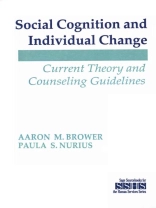Use the following for Social Work catalogs: Social Cognition and Individual Change provides a much needed link among several perspectives in social work practice (such as the ecological or generalist model) and the myriad of atheoretical ‘techniques’ that social work practitioners must choose from. This new social work practice book makes more concrete and practical the basic premises of ‘person-environment interaction’ and ′starting where the client is.’ It details the processes through which people perceive and interpret the social world, how problems arise, and how understanding these processes can significantly sharpen our assessments, intervention planning, goal selection, and evaluation. It draws upon the best up-to-date work in cognitive and emotional functioning, self-concept formation and change, and coping with stress. This book goes beyond introductory practice texts in describing how social work theory can guide practice. Special topics include clinical reasoning, the structure of memory, and social-cognitive explanations for psychodynamic phenomenon. Social Cognition and Individual Change should be included in courses for advanced practice and social work practice theory. Use this ad copy for psych: In recent years, there have been some major developments in the area of person-environment interaction–specifically the study of social cognition. Although knowledge of this literature is critical for the helping professional, social cognition in clients has been among the more difficult to adequately assess and use for intervention. Until now. Clear and succinct, Social Cognition and Individual Change offers a comprehensive introduction to a ‘cognitive-ecological’ approach to counseling and clinical practice. To provide a solid conceptual grounding for the reader, the theoretical underpinnings of the cognitive-ecological model are described in detail, including its key components, strengths, and limitations. The model is then applied to relevant stages of practice such as assessment, goal setting, intervention planning, and evaluation. In addition, the authors provide numerous examples to illustrate how practitioners can use the model to enhance their work. Among the other topics covered are social perception and the practitioner, and feedback and follow-through. Social Cognition and Individual Change is perfectly suitable for courses on human behavior in the social environment and courses on practice methods. Human service practitioners, who would like an updated resource to fill a gap in their social psychological training, will also appreciate this volume. ‘The structure of this book allows one to use it for training students as well as a resource for professional practitioners. The material presented in each chapter is reinforced by the material in the succeeding chapter. The authors systematically develop the theoretical underpinnings and practice behaviors requisite for empowering clients and workers.’ –Families in Society Use this for social work catalog: ‘In this era of the cognitive revolution, books that address the use of cognitive techniques to facilitate personal change are abundant. None, however, match the conceptual depth and clarity offered by Brower and Nurius. . . . By using clear conceptual descriptions, vivid and relevant examples, step-by-step procedural guidelines, chapter introductions, and capsule summaries, Brower and Nurius deftly follow their own prescriptions about how to capture attention, prime associations, and facilitate recall.’ –from the foreword by Sharon B. Berlin, The University of Chicago Use this quote for Psych crowd: ‘Brower and Nurius have put together a valuable and practical blend of theory and research from areas of social cognition, self psychology, and counseling practice. I recommend it highly.’ –Michael J. Mahoney, University of North Texas
Mục lục
Introduction
Characteristics of a Cognitive-Ecological Model
The Niche and the Self-System
Basic Elements for Working with the Cognitive-Ecological Model in Direct Practice
Goal Striving, Possible Selves, and Possible Niches
Social Perception and the Practitioner
Assessment
Goal-Setting and Contracting
Intervention Planning and Implementation
Feedback and Follow-Through
Epilogue
Appendix
Case Study
Jeanne












